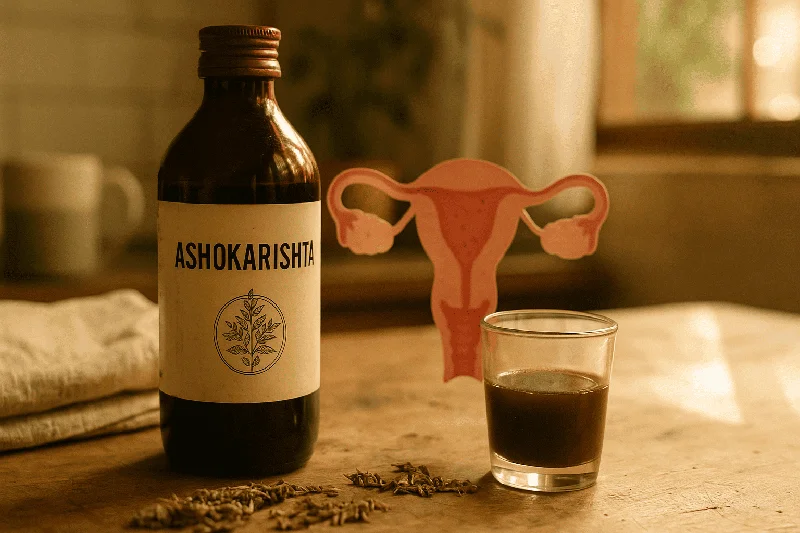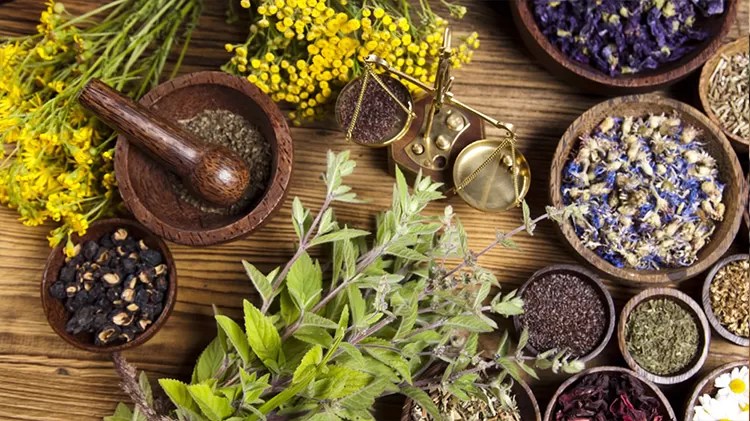Ashokarishta for PCOS: Ayurvedic Solution for Hormonal Balance and Health

Introduction to PCOS and Ashokarishta
Polycystic Ovary Syndrome (PCOS) is a common hormonal disorder affecting women of reproductive age, leading to irregular menstrual cycles, excessive hair growth, acne, and difficulty in conceiving. Ayurveda offers a natural approach to managing PCOS by addressing the underlying imbalances in the body. One of the most effective Ayurvedic remedies for PCOS is Ashokarishta, a traditional tonic known for its ability to regulate menstrual cycles, balance hormones, and improve overall reproductive health. This article explores the benefits, uses, and applications of Ashokarishta for managing PCOS and supporting women’s health.
Don't wait or self medicate. Start chat with Doctor NOW
Historical Roots & Ayurvedic Perspective
Ashokarishta is a classical Ayurvedic formulation made from the bark of the Ashoka tree (Saraca asoca), along with other supportive herbs like Dhataki (Woodfordia fruticosa). This formulation has been used for centuries in Ayurveda to treat gynecological conditions, especially those related to menstrual irregularities and hormonal imbalances. Ashokarishta is highly regarded for its ability to strengthen the uterus, improve menstrual health, and support reproductive function. It is especially beneficial in managing conditions like PCOS, where hormone imbalances disrupt regular menstruation and ovarian function.
In Ayurveda, PCOS is often linked to an imbalance in the Vata and Pitta doshas, which affects the hormonal system and disrupts the natural rhythm of the menstrual cycle. Ashokarishta helps to restore this balance by regulating the flow of hormones and improving the function of the ovaries and uterus.
Key Benefits of Ashokarishta for PCOS
1. Hormonal Balance
Ashokarishta plays a key role in balancing the female reproductive hormones, which are often out of sync in women with PCOS. The formulation helps regulate the levels of estrogen and progesterone, two hormones crucial for maintaining a regular menstrual cycle. By restoring hormonal balance, Ashokarishta can reduce symptoms such as irregular periods, heavy bleeding, and anovulation (lack of ovulation), which are common in PCOS.
2. Menstrual Health and Regularity
One of the most significant benefits of Ashokarishta for women with PCOS is its ability to regulate menstrual cycles. The tonic is known to reduce the occurrence of skipped periods or heavy, painful bleeding by promoting a healthy uterine lining and stimulating the menstrual flow. This helps women with PCOS regain regularity in their periods, which is crucial for fertility and overall reproductive health.
3. Reduces Excess Hair Growth (Hirsutism)
Excessive hair growth (hirsutism) is a common symptom of PCOS due to elevated levels of androgens (male hormones). Ashokarishta has a soothing effect on the Pitta dosha and can help reduce the excessive secretion of androgens in the body. By balancing Pitta, Ashokarishta can reduce the occurrence of unwanted facial and body hair growth associated with PCOS.
4. Uterine Health and Strengthening
Ashokarishta is known for its ability to strengthen the uterus and improve its function. It helps in reducing uterine inflammation and promoting overall uterine health. For women with PCOS, where the ovaries and uterus may become inflamed or congested, Ashokarishta aids in clearing blockages and improving the reproductive system’s overall functioning.
5. Supports Ovulation and Fertility
PCOS is often associated with anovulation, which makes it difficult for women to conceive. Ashokarishta helps restore the natural rhythm of the menstrual cycle, thereby encouraging ovulation and improving fertility. By regulating hormones and enhancing uterine health, Ashokarishta provides a natural way to enhance reproductive health and increase the chances of conception.
How Ashokarishta Works for PCOS
Ashokarishta works by balancing the doshas and supporting the overall health of the female reproductive system. Its action on the Vata and Pitta doshas helps regulate hormonal secretion and promotes regular ovulation. The herbs in Ashokarishta have anti-inflammatory, antispasmodic, and toning effects on the uterus, which contribute to better menstrual health and hormonal balance. The tonic also supports detoxification and promotes the elimination of toxins (ama) that could further disrupt reproductive health.
Choosing the Right Ayurvedic Remedies
When using Ashokarishta for PCOS, it is essential to consult with an experienced Ayurvedic practitioner to ensure it is the right fit for your constitution (Prakriti) and specific health needs. An Ayurvedic practitioner can provide personalized guidance on dosage, potential combinations with other remedies, and complementary lifestyle and dietary recommendations to support your overall health.
Recommended Dosage & Usage of Ashokarishta
The recommended dosage of Ashokarishta for managing PCOS typically varies based on individual health conditions and needs. In general:
- Dosage: Take 15-20 ml of Ashokarishta, diluted in an equal amount of water, once or twice daily.
- Timing: It is usually recommended to take Ashokarishta after meals to aid digestion and enhance its effects on the reproductive system.
- Duration: Ashokarishta can be taken for a period of 3 to 6 months, depending on the severity of the symptoms. Consistent use is key for achieving optimal results.
- Professional Guidance: Always consult an Ayurvedic professional for the correct dosage and duration of treatment tailored to your specific needs.
Potential Side Effects & Precautions
Ashokarishta is generally safe when used as directed, but there are a few precautions to keep in mind:
- Digestive Discomfort: Some individuals may experience mild digestive upset or bloating when starting Ashokarishta. It is advised to start with a lower dose and gradually increase it as your body adjusts.
- Pregnancy & Nursing: Pregnant or nursing women should consult an Ayurvedic practitioner before using Ashokarishta, as it may not be suitable during pregnancy.
- Allergic Reactions: If any allergic reactions, such as rash or irritation, occur, discontinue use and consult a healthcare professional.
Frequently Asked Questions for Ashokarishta for PCOS
How does Ashokarishta help with PCOS?
Ashokarishta helps with PCOS by balancing reproductive hormones, promoting regular menstrual cycles, and improving uterine health. It also reduces symptoms such as excess hair growth and irregular periods by regulating hormonal imbalances associated with PCOS.
Can Ashokarishta cure PCOS?
While Ashokarishta cannot cure PCOS, it is an effective Ayurvedic remedy for managing the symptoms of the condition, such as irregular periods, hormonal imbalances, and uterine health issues. It helps restore balance and supports overall reproductive health.
How long should I take Ashokarishta for PCOS?
Ashokarishta can be taken for a period of 3 to 6 months, depending on the severity of the symptoms. Consistency is important, and it is recommended to consult with an Ayurvedic practitioner for guidance on the appropriate duration and dosage.
Are there any side effects of using Ashokarishta for PCOS?
Ashokarishta is generally safe when used as directed, but some individuals may experience mild digestive discomfort or bloating. It is important to start with a lower dose and consult an Ayurvedic professional to ensure proper usage.
Can Ashokarishta help with fertility in women with PCOS?
Yes, Ashokarishta can help improve fertility in women with PCOS by regulating menstrual cycles, supporting ovulation, and promoting a healthy uterine environment. By balancing hormones and strengthening reproductive health, it can enhance the chances of conception.
Can I use Ashokarishta alongside other PCOS treatments?
Yes, Ashokarishta can be used alongside other treatments for PCOS, including conventional medications or other Ayurvedic remedies. However, it is important to consult with both your healthcare provider and Ayurvedic practitioner to ensure there are no conflicts between treatments.
Where can I buy authentic Ashokarishta?
Authentic Ashokarishta can be purchased from trusted Ayurvedic pharmacies, certified Ayurvedic practitioners, or reputable online stores specializing in Ayurvedic products. Always ensure that the product is of high quality and sourced from a reliable vendor.
Conclusion & Expert Insights
Ashokarishta is a powerful Ayurvedic remedy that offers natural support for managing PCOS by regulating hormones, improving menstrual health, and enhancing fertility. By incorporating Ashokarishta into a holistic Ayurvedic treatment plan, women with PCOS can experience improved reproductive health, hormonal balance, and overall well-being. Always consult with an Ayurvedic practitioner for personalized guidance to achieve the best results for your health.
References & Further Reading
- Lad, V. (2002). Ayurveda: The Science of Self-Healing.
- Sharma, P.V. (1995). Ayurvedic Healing: A Comprehensive Guide.
- National Institute of Ayurveda:
- Journal of Ayurveda and Integrative Medicine for research articles on Ashokarishta and its benefits for PCOS.
Got any more questions?
Ask Ayurvedic doctor a question and get a consultation online on the problem of your concern in a free or paid mode.
More than 2,000 experienced doctors work and wait for your questions on our site and help users to solve their health problems every day.



